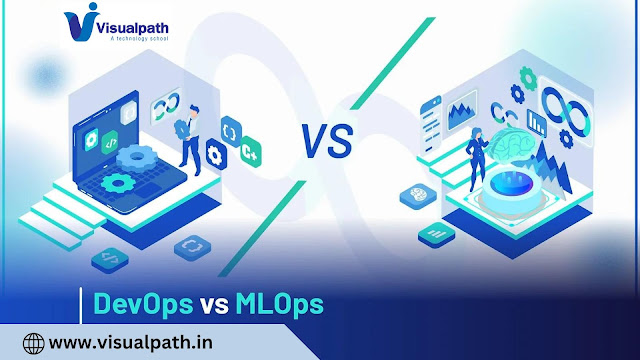MLOps Vs. DevOps: What’s the Difference?
Introduction:
In the dynamic world of
technology, the evolution of software development and machine learning has
given rise to operational practices such as DevOps and MLOps. While these terms
share similarities, they cater to distinct domains. This blog post delves into
the nuanced differences between MLOps and DevOps, emphasizing their unique
characteristics and their roles in modern IT projects. Additionally, we will
explore the current trends shaping the landscape of DevOps and MLOps.
DevOps, a portmanteau of
Development and Operations, encompasses practices aimed at unifying software
development and IT operations. The primary objective of DevOps is to streamline
the development lifecycle, deliver high-quality software, and foster
collaboration between development and operations teams. Machine
learning operations.
MLOps vs. DevOps: Key Differences:
Data-Centric vs. Code-Centric:
DevOps: Primarily
focuses on code versioning and infrastructure automation.
MLOps: Places a
strong emphasis on managing and versioning data, considering it a central
component in machine learning workflows.
Model Complexity:
DevOps: Generally
deals with application code and infrastructure.
MLOps: Acknowledges
the unique challenges posed by the complexity of machine learning models,
introducing specialized tools and practices for versioning, deployment, and
monitoring.
Experimentation:
DevOps: Emphasizes
stability and reliability in software delivery.
MLOps: Recognizes
the iterative nature of machine learning projects, incorporating features for
tracking and managing experiments, hyper parameters, and model performance. Machine
Learning Operations Training
Version Control and Reusability:
Version Control in DevOps:
Manages versions of code,
configurations, and infrastructure.
Provides stability between
testing, production, and development environments.
Version Control in MLOps:
Extends version control to include
data and models.
Enables reproducibility by
tracking changes in datasets and model versions.
Reusability in DevOps:
Focuses on reusable code
components, configurations, and automation scripts.
Encourages the creation of modular
and shareable artifacts.
Reusability in MLOps:
Stresses the importance of
reusable data preprocessing and feature engineering pipelines. -MLOps
Training Course in India
Encourages the reuse of model
components and training workflows.
DevOps and MLOps Trends:
DevOps Trends:
GitOps Adoption:
Overview: GitOps extends the
principles of version control to infrastructure and application delivery,
leveraging Git as a single source of truth.
Impact: Enhances collaboration,
traceability, and automation in deploying and managing infrastructure.
ChatOps Integration:
Overview: ChatOps integrates
communication tools (such as Slack or Microsoft Teams) into the development and
operations processes.
Impact: Facilitates real-time
collaboration, automation through chat interfaces, and centralized communication
channels.
DevSecOps Implementation:
Overview: DevSecOps integrates
security practices into the DevOps pipeline from the outset, ensuring security
is a shared responsibility.
Impact: Improves security posture,
reduces vulnerabilities, and ensures continuous monitoring throughout the
development lifecycle.
Serverless Computing Adoption:
Overview: Serverless architectures
allow developers to focus on code without managing infrastructure, leading to
increased scalability and cost efficiency.
Impact: Accelerates development,
reduces operational overhead, and scales applications seamlessly based on
demand. -MLOps
Training in Hyderabad
MLOps Trends:
AutoML Integration:
Overview: Automated Machine
Learning (AutoML) streamlines the machine learning model development process,
automating tasks such as feature engineering and hyperparameter tuning.
Impact: Accelerates model
development, enables non-experts to build models, and improves overall
efficiency.
Explainable AI Emphasis:
Overview: Explainable AI focuses
on making machine learning models more interpretable and understandable,
addressing the "black-box" nature of complex models.
Impact: Builds trust in machine
learning models, aids in compliance with regulatory requirements, and enhances
model accountability.
Model Monitoring Platforms:
Overview: Dedicated tools and
platforms for monitoring the performance of deployed machine learning models,
detecting drift, and ensuring ongoing model health. -MLOps
Online Training
Impact: Improves model reliability,
enables timely interventions, and ensures models align with changing data
patterns.
Federated Learning Adoption:
Overview: Federated Learning
involves training machine learning models across decentralized devices while
keeping data localized.
Impact: Preserves privacy, reduces
the need for centralized data storage, and enables collaborative learning
across distributed environments.
Conclusion:
As organizations continue to
embrace DevOps and MLOps methodologies, the synergy between these practices
will play a crucial role in delivering innovative, reliable, and scalable
solutions. By understanding the key differences, incorporating robust version
control strategies, emphasizing reusability, and staying abreast of evolving
trends, businesses can navigate the complexities of modern IT landscapes with
confidence, ensuring successful development and deployment of both traditional
software projects and machine learning initiatives. Stay tuned to these trends
as they shape the future of DevOps and MLOps.
Visualpath
is the Best Software Online Training Institute in Ameerpet, Hyderabad. Avail
complete Machine
Learning Operations Training by
simply enrolling in our institute, Hyderabad. You will get the best course at
an affordable cost.
Attend
Free Demo
Call on - +91-9989971070.
Visit: https://www.visualpath.in/mlops-online-training-course.html




Comments
Post a Comment